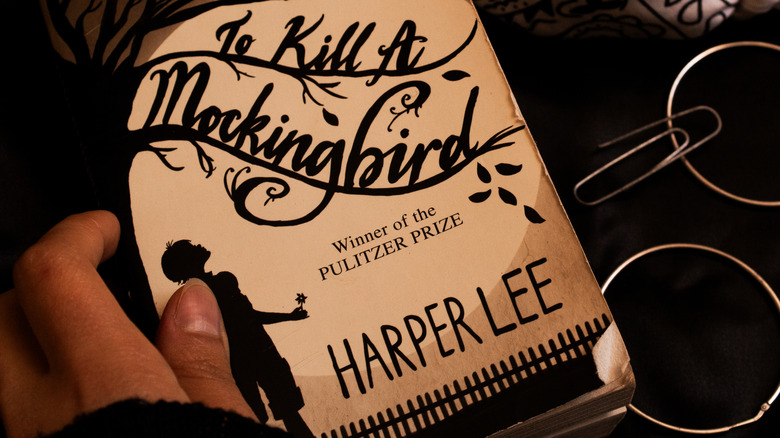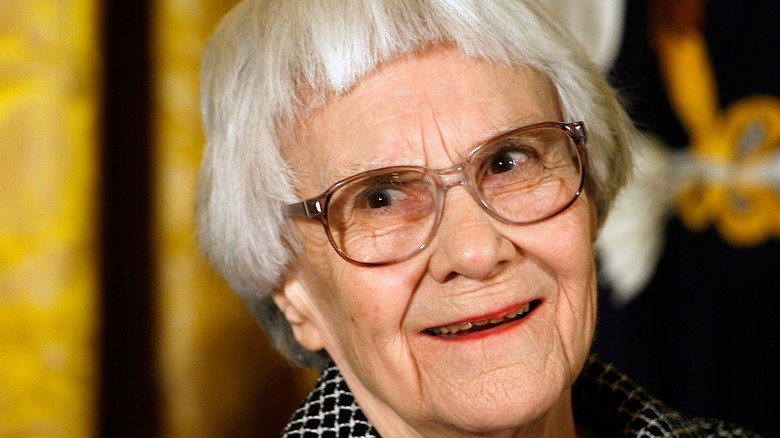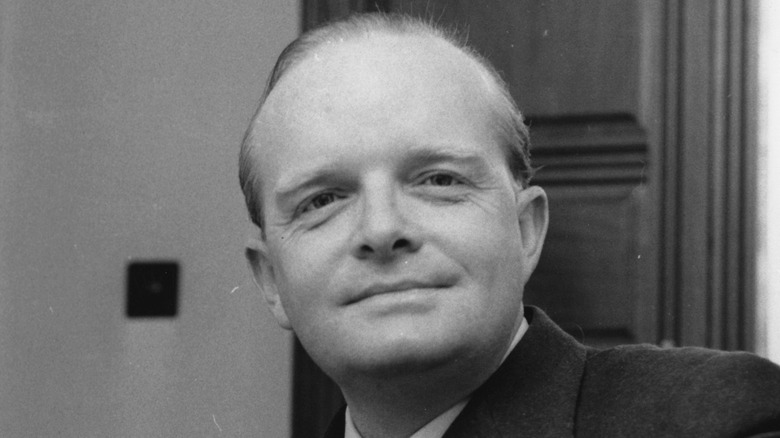The To Kill A Mockingbird Theory That Would Change Everything
When writer Harper Lee's first novel, "To Kill A Mockingbird," was published in 1960, it became an instant classic of American literature that is still widely read and taught to this day. Per Britannica, Lee based the book's hero, lawyer Atticus Finch, on her father, Amasa Coleman Lee, who was also a lawyer as well as a newspaper editor. In 1919, Amasa Lee unsuccessfully defended two Black men accused of murder in his home state of Alabama. The incident later inspired the trial in "Mockingbird" in which Finch serves as the defense lawyer for a Black man, Tom Robinson, who is falsely accused of raping a white woman. Another "Mockingbird" character inspired by a real person is the Finches' neighbor, a young boy named Charles Baker "Dill" Harris, who is a good friend of the story's narrator, Jean Louise "Scout" Finch, and her brother, Jem.
As reported by Biography, Dill is based on Harper Lee's actual childhood friend and neighbor, writer Truman Capote. Like Dill, young Capote came to live with his aunt in Monroeville, Alabama after his parents divorced. He and Lee bonded over their shared love of reading and writing and collaborated on stories together. When Capote published his own first novel in 1948, "Other Voices, Other Rooms," he based the character of young tomboy Idabel Tompkins on Lee. Soon after this, Capote convinced Lee to join him in New York City, where she began work on what would become "Mockingbird."
Truman Capote and Harper Lee were friends and collaborators
Not only did Harper Lee (above) and Truman Capote base characters in their novels on one another, they continued collaborating as adults. Per Biography, when Capote set off for Holcomb, Kansas in 1959 to research the murder of the Clutter family as an investigative reporter for The New Yorker, he hired Lee as his research assistant. Lee had just turned in the manuscript for "To Kill A Mockingbird" and had plenty of free time as well as a personal interest in crime, and so she joined Capote. Lee's comforting manner reportedly balanced out Capote's more flamboyant personality and allowed for access to residents of Holcomb involved with the murders. She also took copious notes for Capote to use and wrote an anonymous journal article praising local law enforcement working the case and promoting Capote's work. The series of articles eventually became the book "In Cold Blood," which many people credit as the first book in the genre of true crime.
"To Kill A Mockingbird," meanwhile, became a runaway success and won the Pulitzer Prize for literature in 1961. Capote was jealous of his friend's critical and financial success and it led to a rift in their friendship. Eventually, a persistent rumor arose that Capote had actually written "Mockingbird" himself, or at least heavily edited it before Lee submitted it for publication. According to an NPR interview with Dr. Wayne Flynt, retired professor of history from Auburn University, the rumor probably stems from the fact that Lee published so infrequently during her lifetime.
Could Capote have possibly written To Kill a Mockingbird?
Flynt told NPR that judging Harper Lee for publishing so little during her lifetime "basically judges her by the standards of our own culture, which is once you've got a taste of fame and fortune, why in the world wouldn't you continue it?" He also notes that some claim that literary critic and editor Pearl Belle was known to tell people that Truman Capote (above) had implied to her that he had been assisted Lee in writing "Mockingbird." Per Biography, Lee once wrote to another friend about the fallout between her and Capote, noting, "I was his oldest friend, and I did something Truman could not forgive: I wrote a novel that sold. He nursed his envy for more than 20 years."
In 2006, researchers found a letter Capote wrote in 1959 to his aunt that essentially served as proof that he hadn't been involved in writing or editing "Mockingbird." In the letter, he writes that he has read the novel, yet to be published, liked it, and found Lee very talented. He doesn't mention any sort of personal involvement in the book. Flynt went on to point out to NPR that not only were Capote's and Lee's writing styles and literary voices completely different, but there was no way that Capote, "known for his enormous ego and for his banter and for his self-promotion ... would not have claimed credit for [Lee's success] if he in fact done it." The whole idea, he said, "is simply too much for me to believe."


